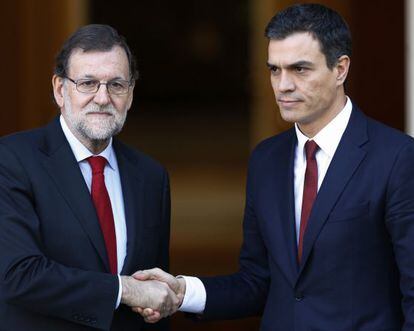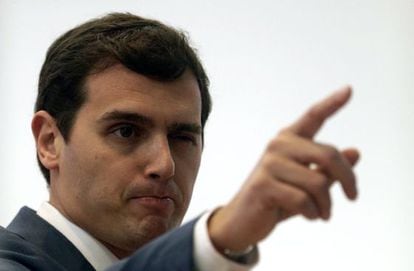Socialist leader tells Rajoy he won’t support him at investiture vote
Speaking after brief meeting Pedro Sánchez says new elections are “last option” Emerging party leader Albert Rivera says he wants to break the gridlock following elections

Three days after Spanish general elections produced a fragmented scenario with no strong winner, two of the country’s main political leaders held a series of press conferences to confirm or deny rumors of cross-party deals.
At mid-morning on Wednesday, Albert Rivera, leader of emerging group Ciudadanos, called on the country’s two largest parties, the Popular Party (PP) and the Socialist Party (PSOE), to join him in a three-way alliance that would allow Spanish politics to move forward again.
A no to Rajoy is a yes to the changes that Spain needs”
Socialist leader Pedro Sánchez
“We are asking the three parties that defend our constitutional framework to sit down at the negotiating table and propose a road map to reform Spain,” he told reporters. “This road map must include democratic and institutional reforms that are urgent in this country.”

These include reforms to voting, education and political party legislation aimed at introducing greater transparency into the system. Rivera’s Pacto por España (Pact for Spain) also includes a defense of national unity in the face of the separatist challenge in Catalonia – where Rivera is from and where Ciudadanos began life as a regional unionist party.
Rivera said he is not inviting Podemos – which won 69 seats in combination with its sister brands in Galicia, Catalonia and Valencia – because the party is in favor of holding a referendum on self-rule in Catalonia.
“[Podemos] wants to break up Spain by ignoring the Constitution,” he said, calling on the need to reform laws to prevent “separatism from growing on the back of the decadence of our system and our institutions.”
Socialists say “no” to Rajoy
Meanwhile, Socialist leader Pedro Sánchez made an appearance of his own at 1.30pm on Wednesday, shortly after meeting briefly with Rajoy, to confirm that his party will not be supporting the latter’s bid to get himself reinstated as prime minister at an upcoming investiture vote.
“We will not support the continuity of the Popular Party [PP] or of Rajoy. We will vote against him,” assured Sánchez. “A no to Rajoy is a yes to the changes that Spain needs.”
But he also sought to allay fears that Spain may have to hold new elections if Rajoy fails to secure enough support.
“We don’t want new elections, we’re going to work to avoid that because it’s the last of our options,” he said. “This poses the challenge of dialogue among the various political groups. We are committed to seeing Spain get a government and to guarantee the plurality that has been expressed by voters.”
A difficult puzzle to piece together
Although the ruling Popular Party (PP) won the most seats in Congress (123), it lost its absolute majority and needs to find external support if it is to form a minority government.
But neither the Socialists (90), Podemos (69), Ciudadanos (40) nor an array of regional parties that made it into Congress are willing to actively support Rajoy’s nomination to a second term in office.
The most Rajoy can hope for is an abstention at the investiture vote, but even this will be hard to come by. Rivera has said his party will abstain and called on the Socialists to do the same rather than seek an alternative leftist coalition of over 10 parties.
“It’s better to try to reform Spain with a minority government, and that will be our role, to drive reforms and try to reach a minimum level of stability so this doesn’t turn into Greece,” said Rivera on Monday.
If no consensus is reached on the new prime minister, Spain could face new elections in early 2016, a worst-case scenario that the conservative leader wants to avoid because of the image of instability it would send out to the world just when the country is emerging from a crippling crisis.
English version by Susana Urra.










































